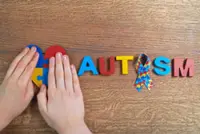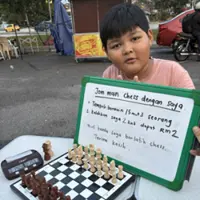KUALA LUMPUR: In Malaysia, awareness about autism is increasing as more parents take proactive steps to have their children undergo assessments as early as one year old if they notice developmental discrepancies.
However, government-run therapy centres for autistic children are still lacking in this country, leaving parents from lower-income groups in a difficult situation as they are unable to afford the fees charged by private centres.
Autism, or autism spectrum disorder (ASD), is a neurological and developmental disorder characterised by challenges with social skills, repetitive behaviour, speech and nonverbal communication.
This medical condition can occur in one to two out of every 1,000 children and is four times more common among boys.
To date, the exact cause of autism has not been fully established but experts believe genetics or chemical imbalances in the brain may be the cause.
Early screening
According to Sabrina Fatimah Azzahara Abdullah, assistant head of department at Autism Gym Centre - a Kuala Lumpur-based therapy centre for children with autism - generally, autism can be detected when children are three years old as symptoms are easier to identify during that period.
"If a child is still unable to speak and cannot socialise with others by the age of three, there is a high possibility that they have ASD.
"However, there are parents who don’t wait (to seek intervention) until the child is three. Instead, they take the child to see a specialist immediately when they notice the child's development is slower than usual," she told Bernama.
She said other characteristics of individuals with ASD include quickly losing focus, not showing any response when called and preferring to be left alone.
"Their condition poses challenges for them in their daily lives," she said, adding although there is no cure for ASD, symptoms can be mitigated through various therapies including speech therapy and behavioural therapy.
She said some people may perceive children with autism as intellectually impaired or mentally disabled but, in reality, they have great potential to lead a more optimal life with early intervention.
"For example, if a child experiences speech delay, we can provide the appropriate therapy to enable them to speak before they turn seven. It’s not impossible for them to appear like a normal person as they approach adulthood,” she said, adding that early intervention programmes can help autistic children manage their daily lives well.
Accepted by society
Content creator Dr Izam Suziani Ismail, the mother of a seven-year-old autistic child who regularly shares her experiences and provides useful tips on her TikTok account, said society is now more aware of autism and sees individuals with ASD as a special group.
"If five years ago, people didn't know what autism was, now information about ASD and related matters can be easily accessed especially through the Internet. If you ask the public, they would say they know about it (ASD) even though not in detail,” she said.
Dr Izam gave up her job as a medical doctor five years ago to take care of her youngest child Wan Muhammad Iyaaz Wan Mohd Shukri who was diagnosed with ASD at the age of two.
"Of course, I was shocked when the specialist informed me... but (eventually) I accepted it as my fate. But who would have thought my youngest child would be diagnosed with autism when my five other children have no medical conditions?
"At first, it was difficult for me to accept it but I didn’t remain in denial for too long. After the diagnosis was confirmed, I immediately (made arrangements) for my son to undergo appropriate therapy.”
Dr Izam said she has no regrets about quitting her 20-year career to care for her special child and ensure he receives continuous treatment and therapy.
And, beginning early last year, she started sharing her experiences caring for Wan Muhammad Iyaaz on TikTok.
"I gained many followers and have also been receiving many positive and constructive comments from other parents who have autistic children,” said Dr Izam, who now has over 32,000 followers on the video-sharing platform.
She added that despite her medical background, she did not know much about ASD initially and had to acquire more information by reading autism-related articles and the views of experts as well as attending relevant courses.
"I’ve been sharing my knowledge (of autism) with my followers on TikTok. Some of the videos I shared received a high number of views and were featured on (TikTok’s) FYP (For Your Page, the first page users land on when they open the TikTok app),” she said.
In April last year, TikTok appointed Dr Izam as a content creator to spread information related to autism in conjunction with World Autism Awareness Month.
She has also been invited by various agencies, including non-governmental organisations and autism support groups, to provide insights and share her knowledge on the medical condition.
More therapy centres needed
Dr Izam, meanwhile, appealed to the government to create more centres providing therapy for autistic children as not many people can afford to send their autistic children to institutions run by private entities as they are too costly.
Pointing to Pusat Permata Kurnia, which is run by the government and offers early intervention programmes and education for children with autism, she said there are only two such centres in this country (one in Kuala Lumpur and the other in Putrajaya), hence parents wishing to enrol their autistic children in one of these centres have to contend with a long waiting list.
"So, many of them rely on the therapy offered at government hospitals but this is only available once every three months, which is inadequate as autistic children need to undergo therapy frequently.
"This is why parents have no choice but to conduct therapy at home themselves, but for those without the knowledge and resources, it can be quite challenging,” she added.
Dr Izam also suggested that autism support and counselling centres be established in housing areas and public locations to make it easier for parents to seek assistance whenever they encounter challenges in raising their autistic children.
"We can’t send them to a playschool... most playschools don’t accept autistic children as this group needs special care,” she said.
"The reality is that caring for an autistic child requires emotional and physical strength. There are times when their parents would feel extremely fatigued and need some rest.
"Look at me... even though I’m home all day taking care of my son, at times I feel exhausted. What about those who have to go to work and need to take care of their special children when they return home?”
World Autism Awareness Day is observed annually on April 2. - Bernama





